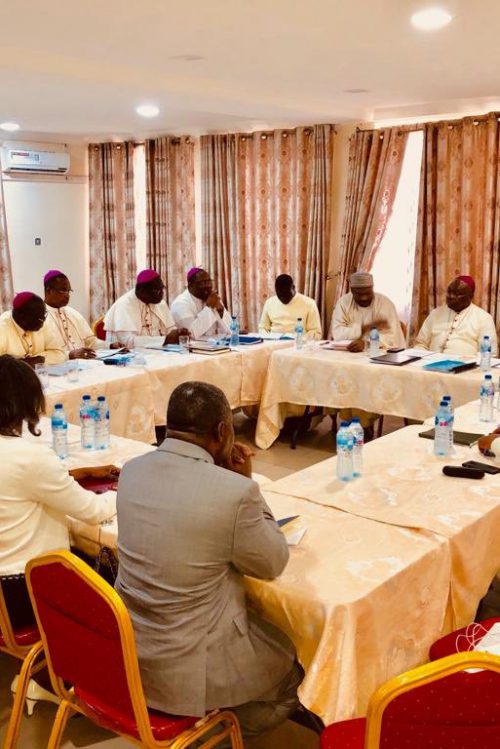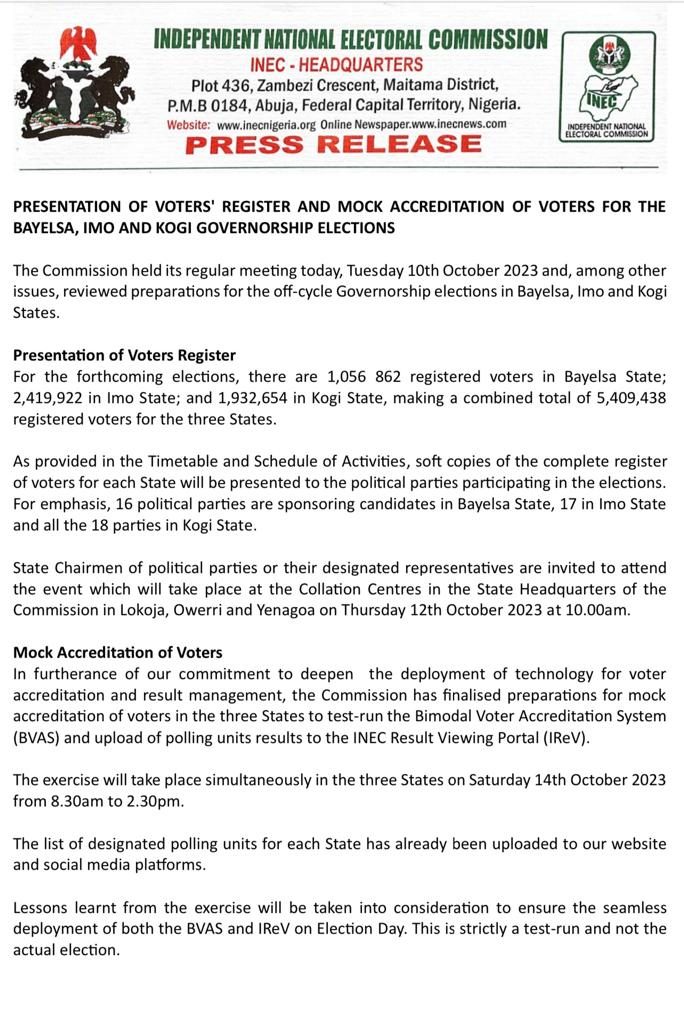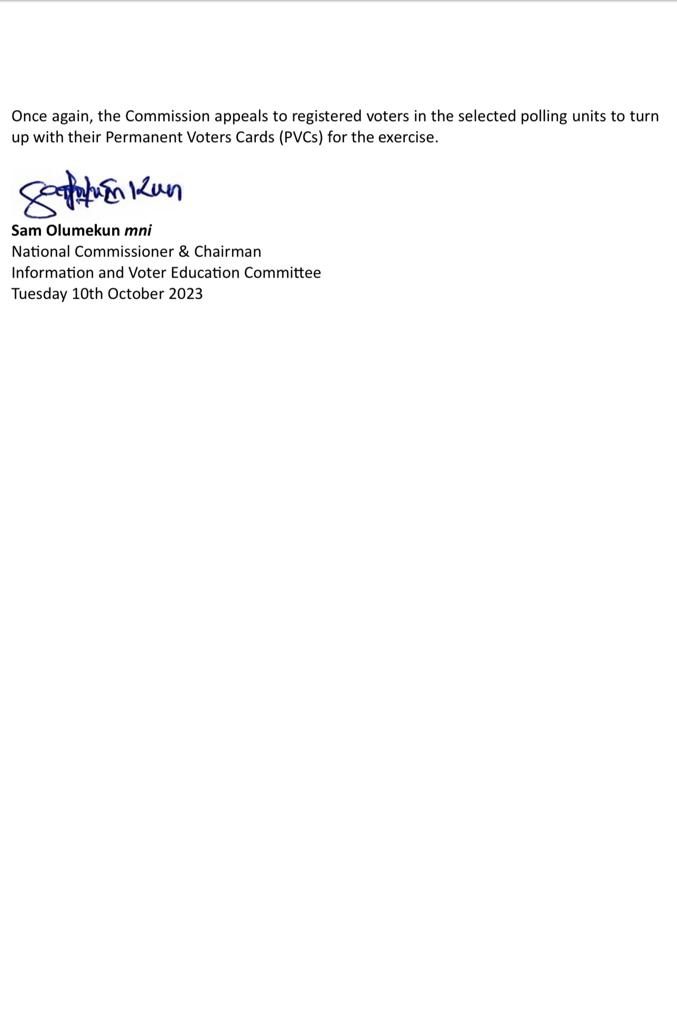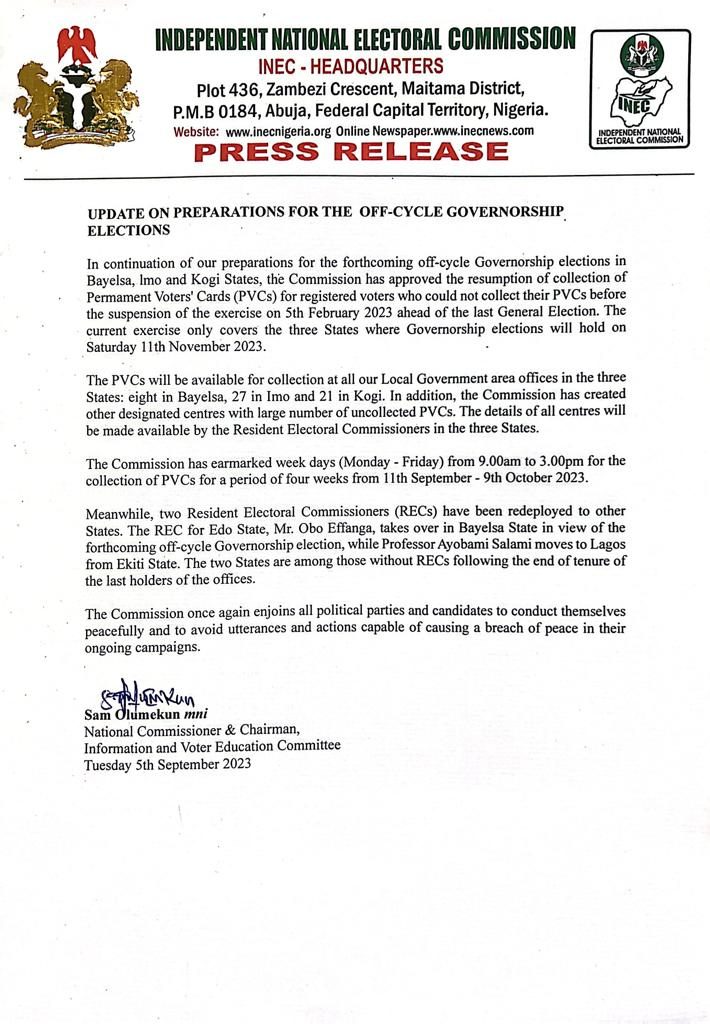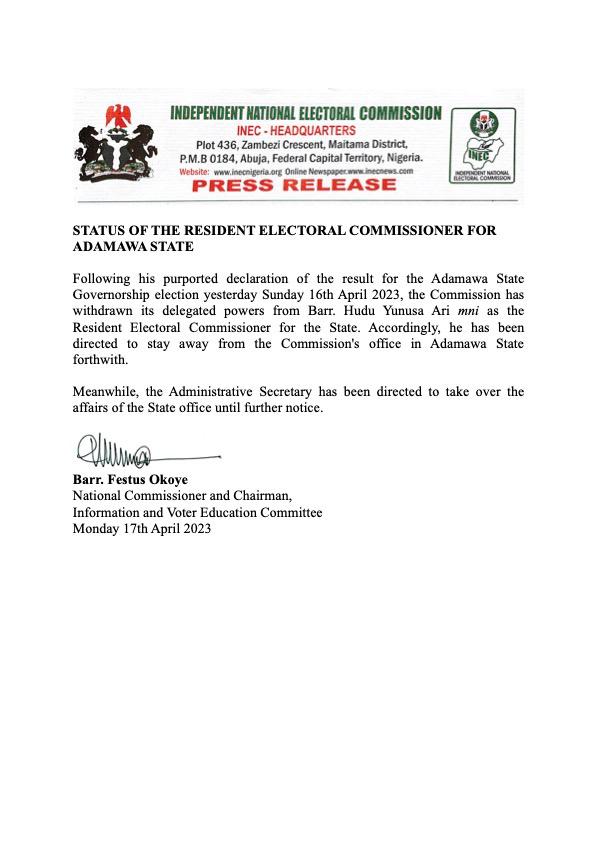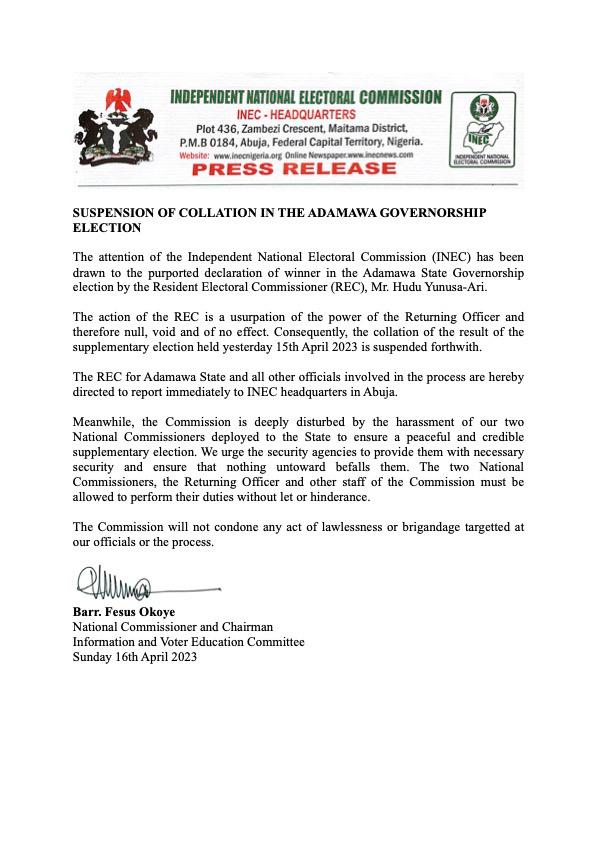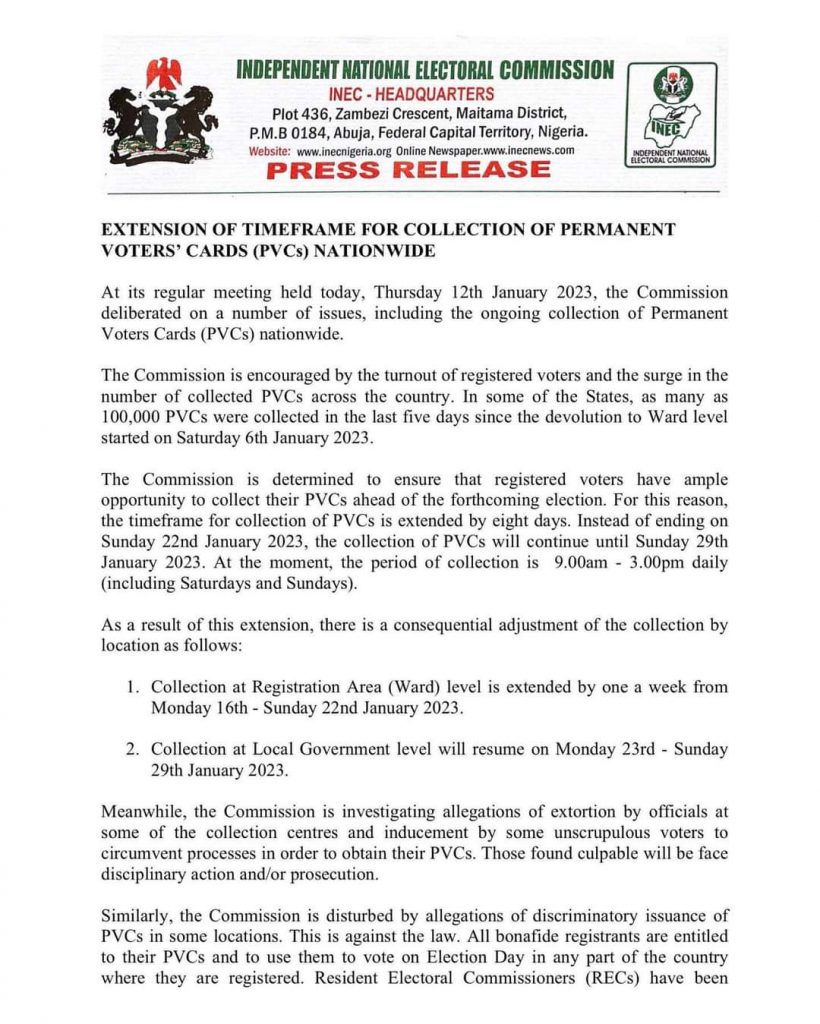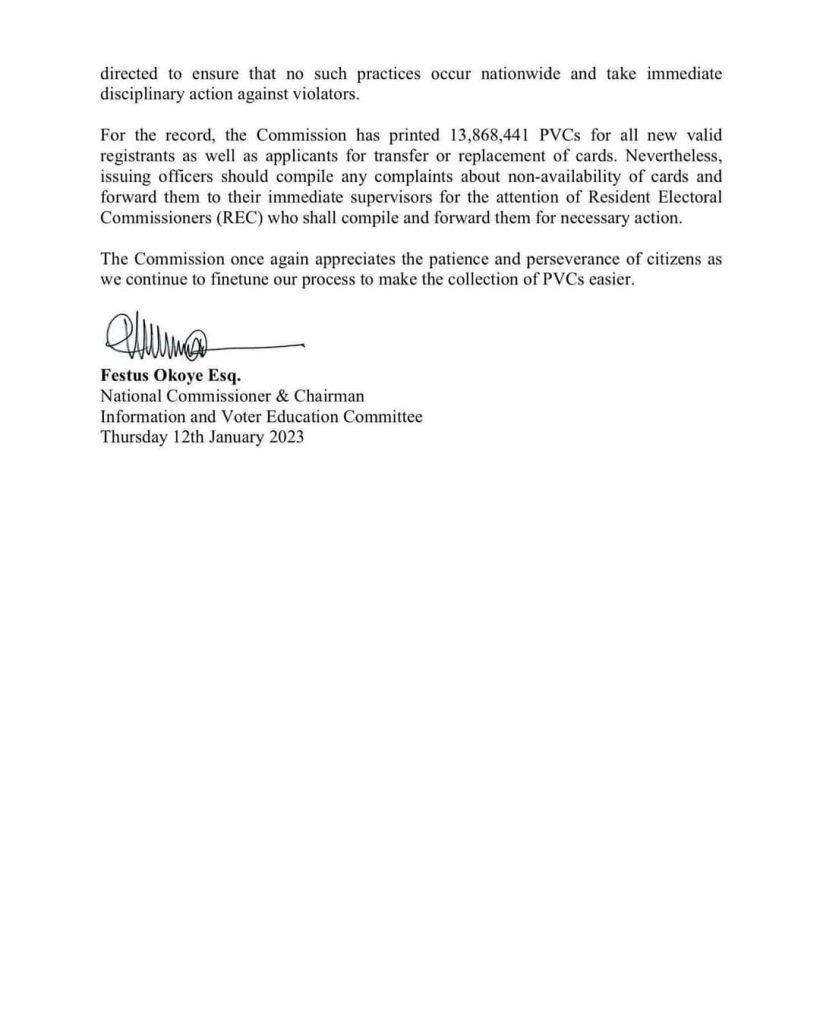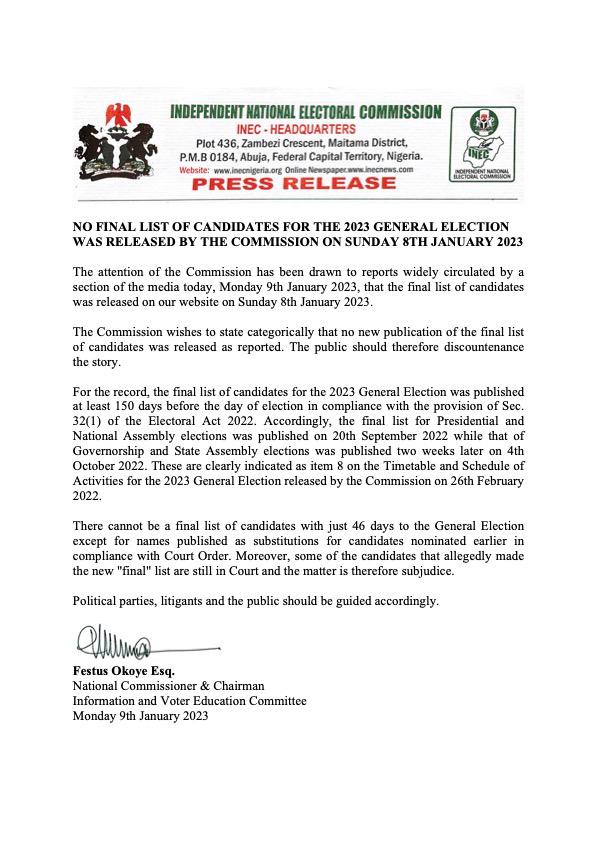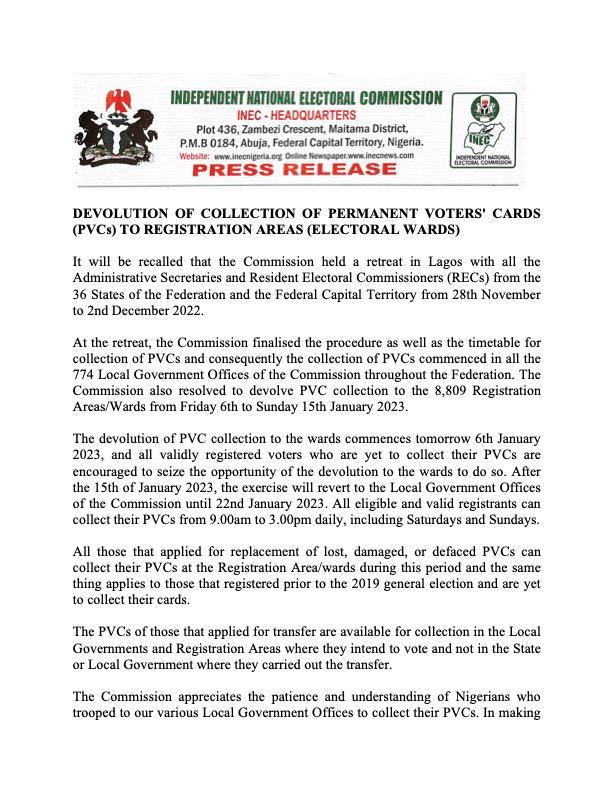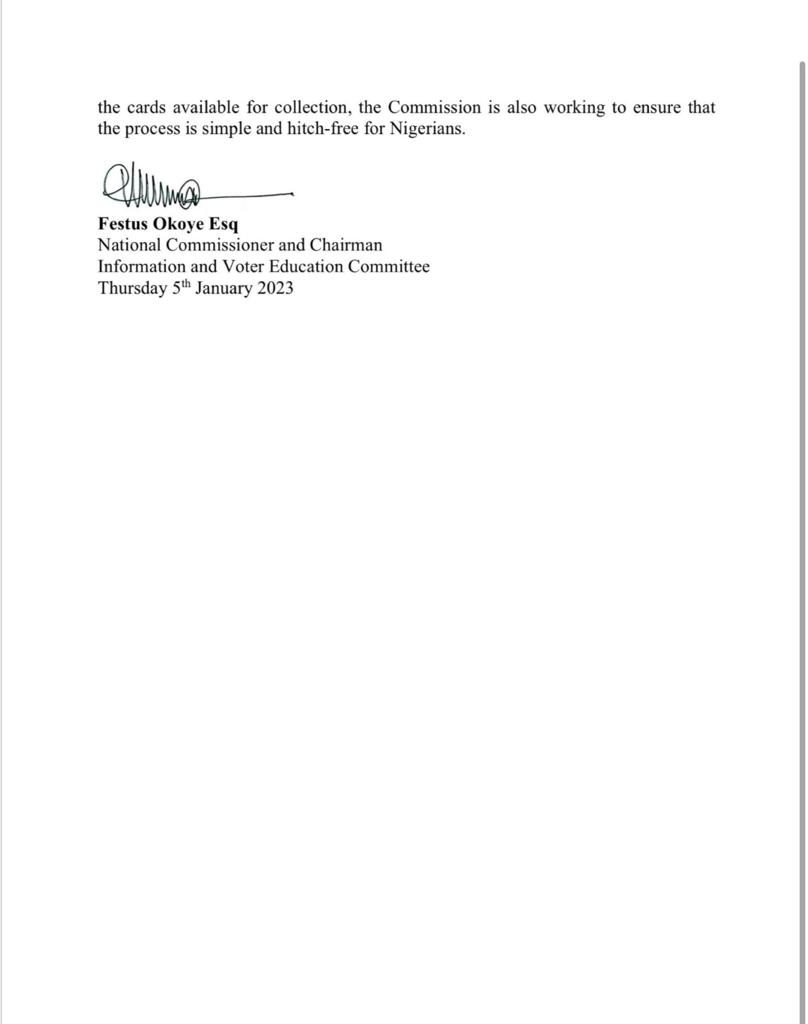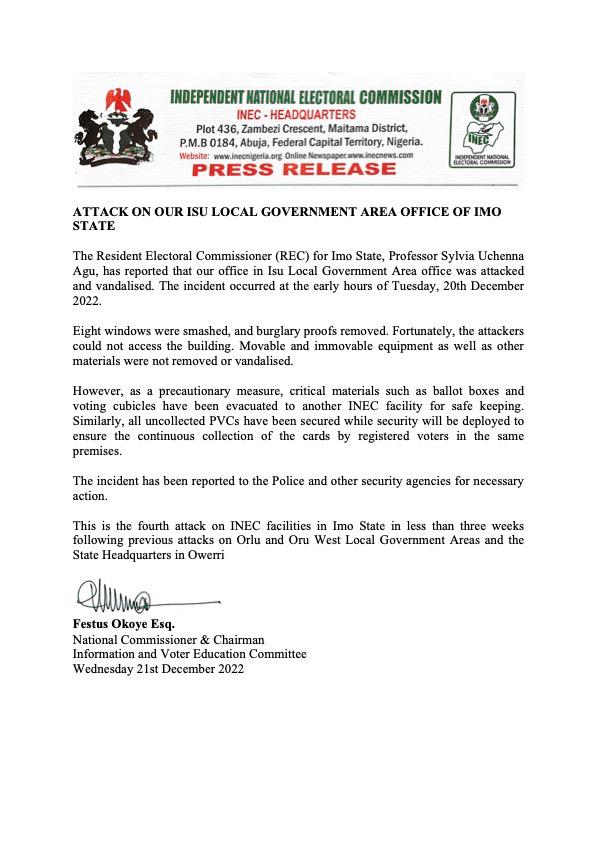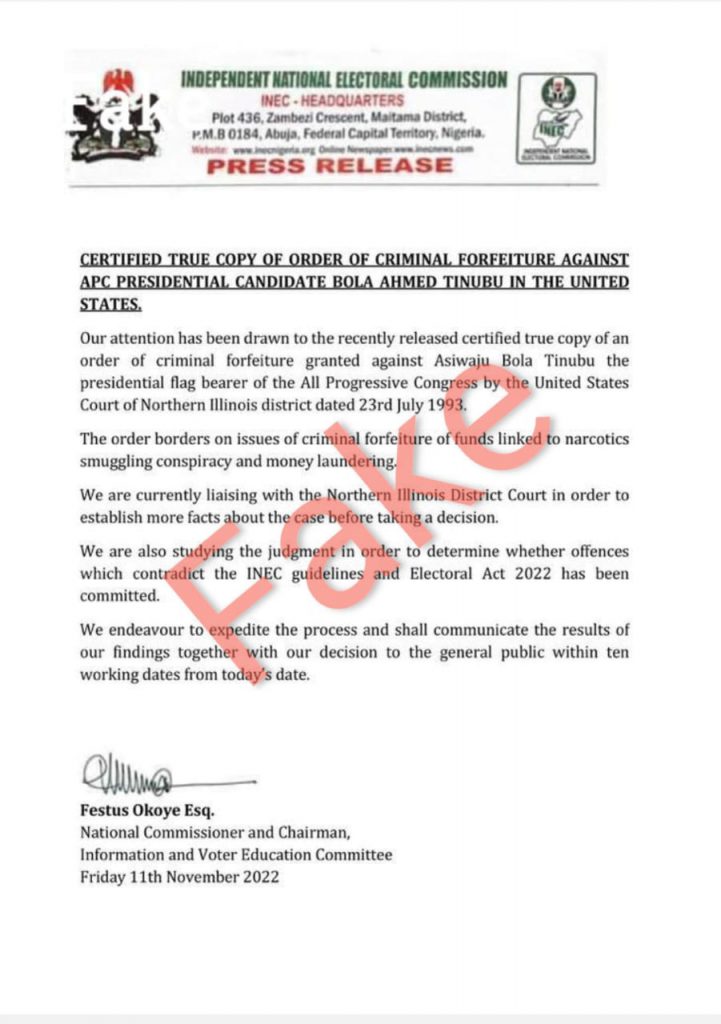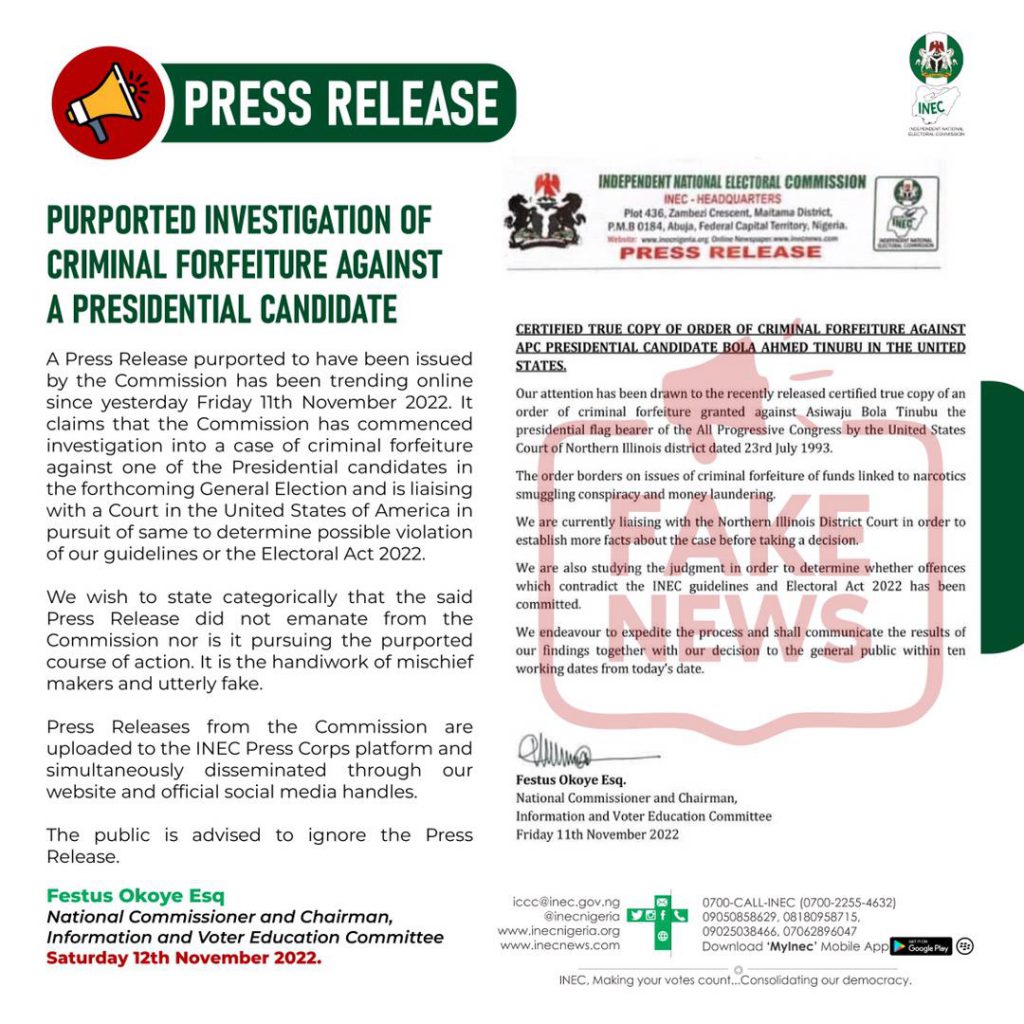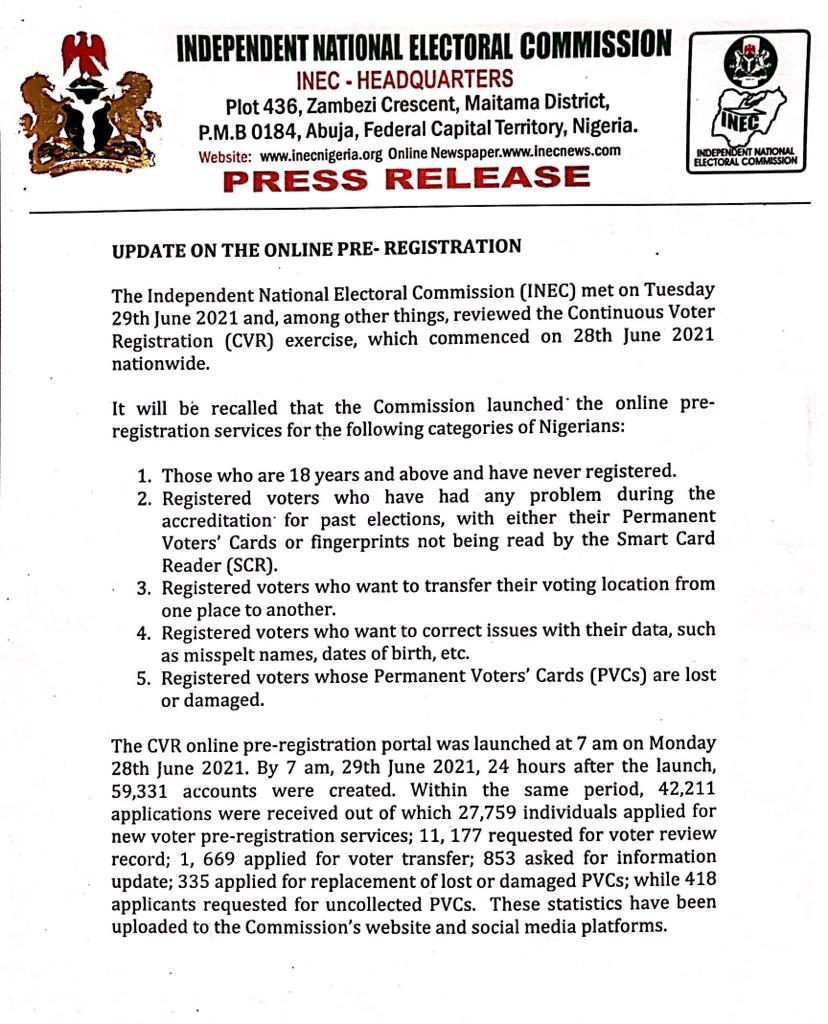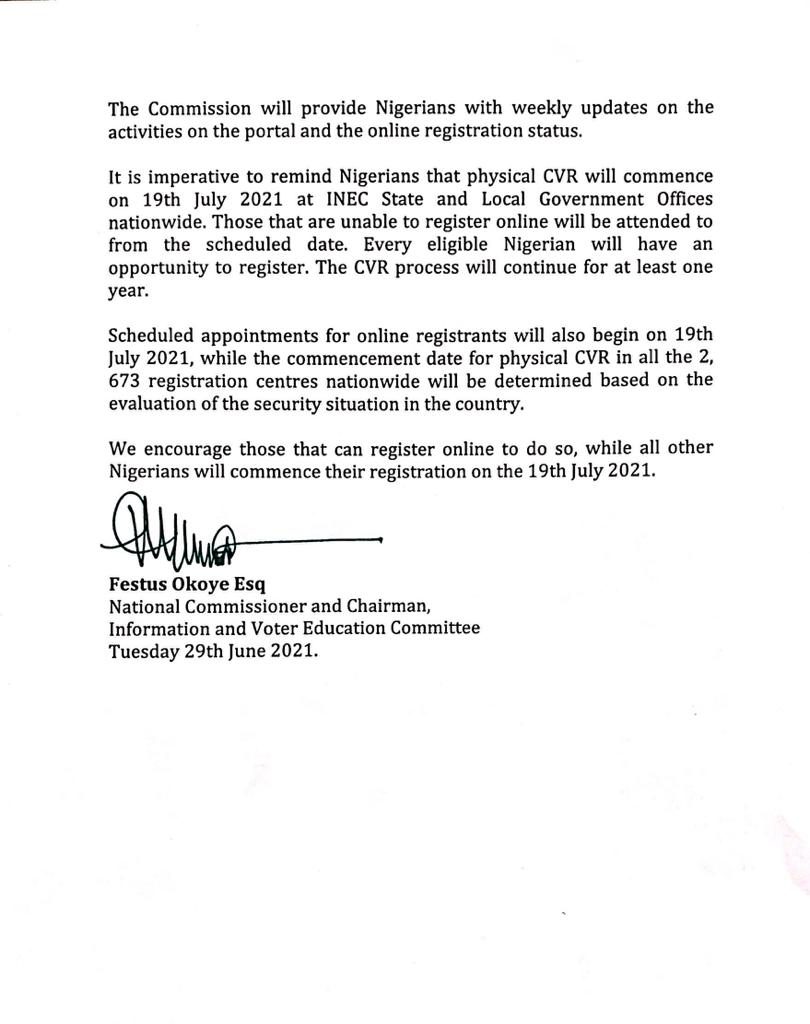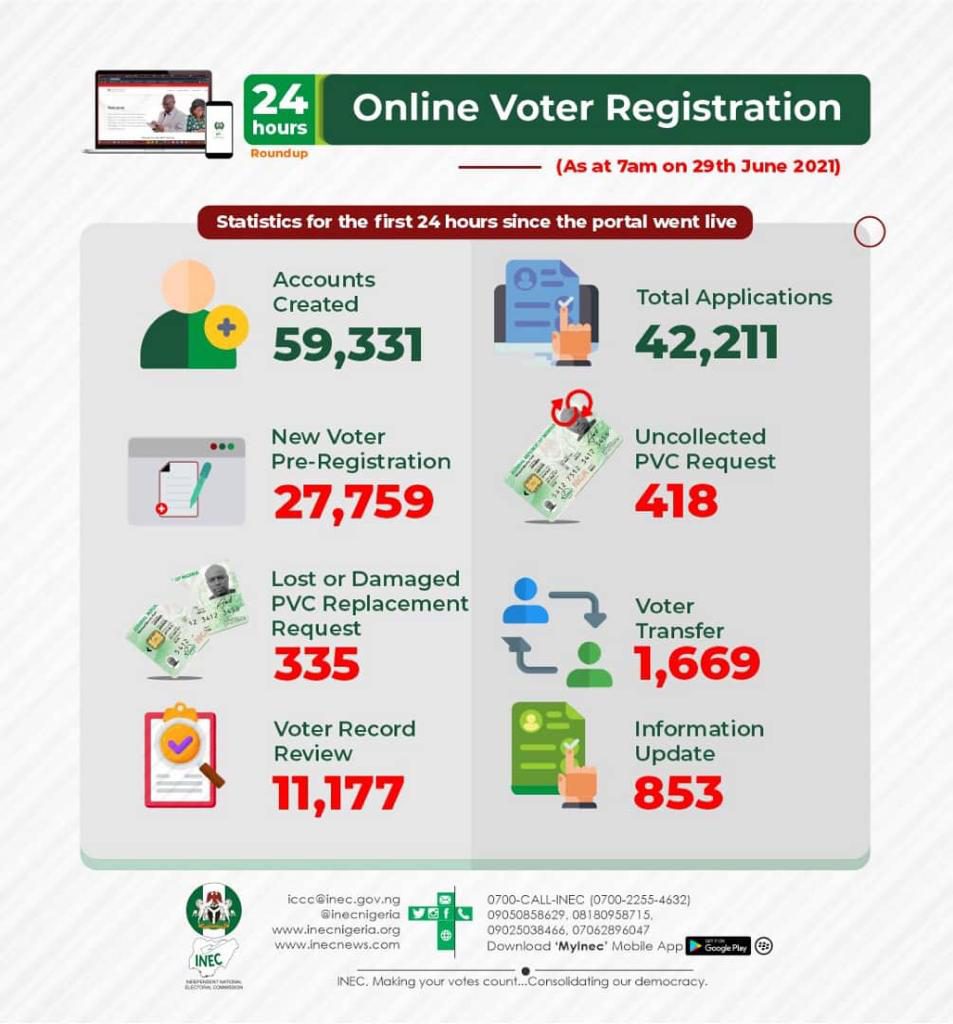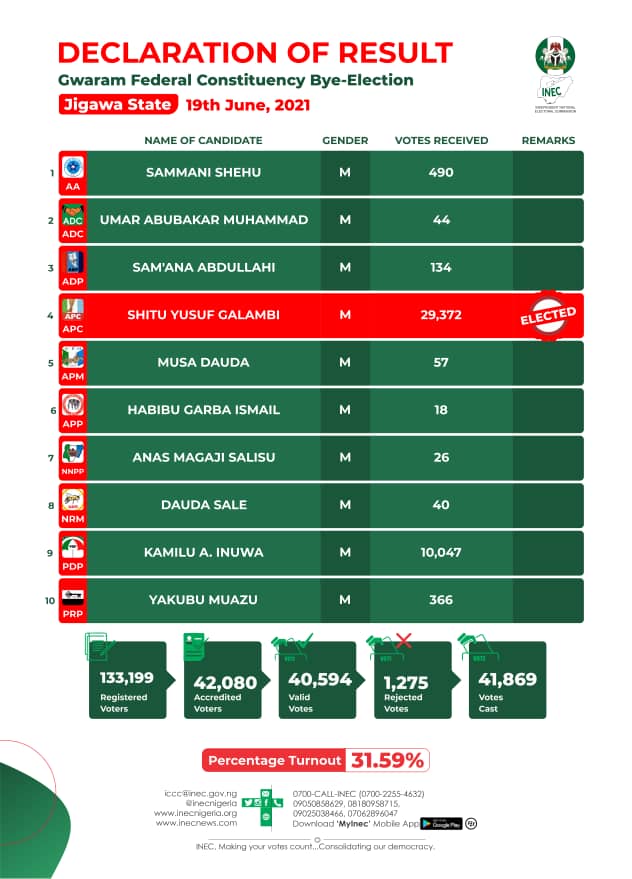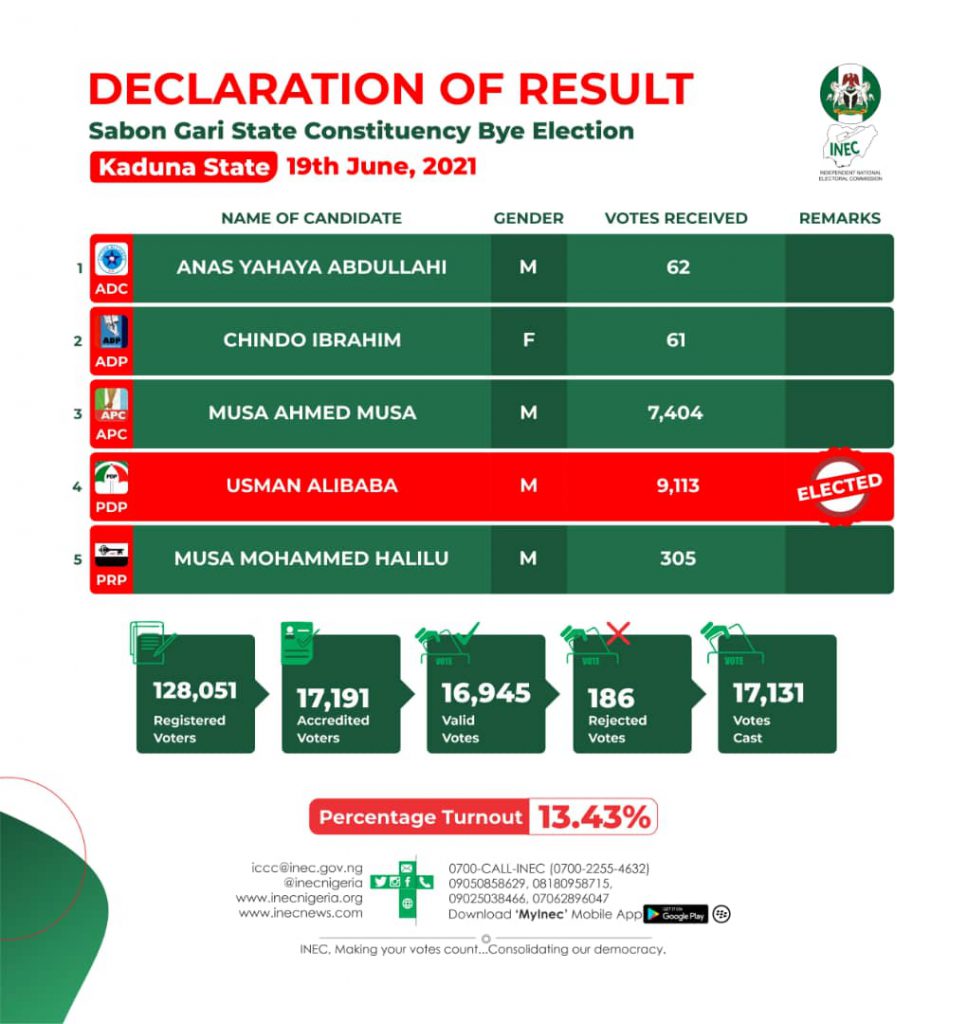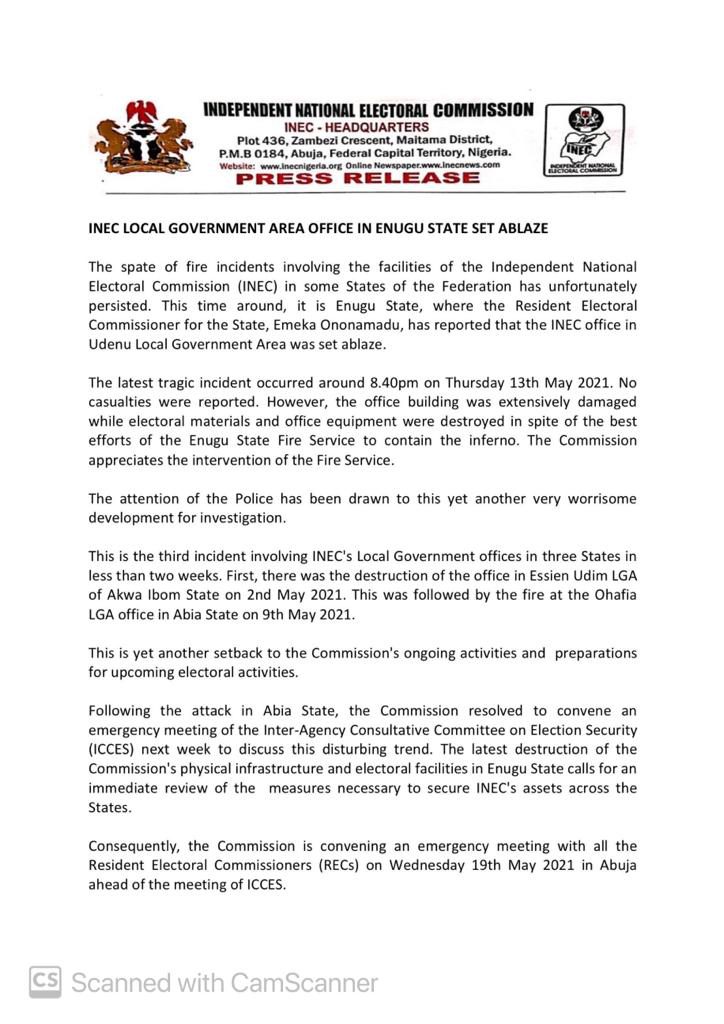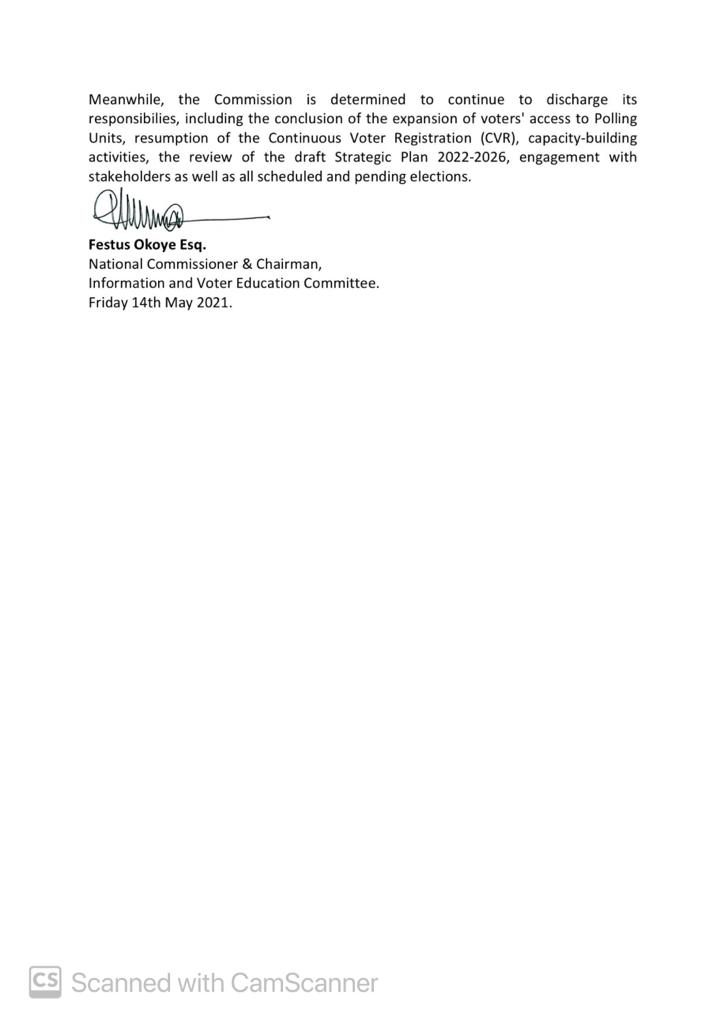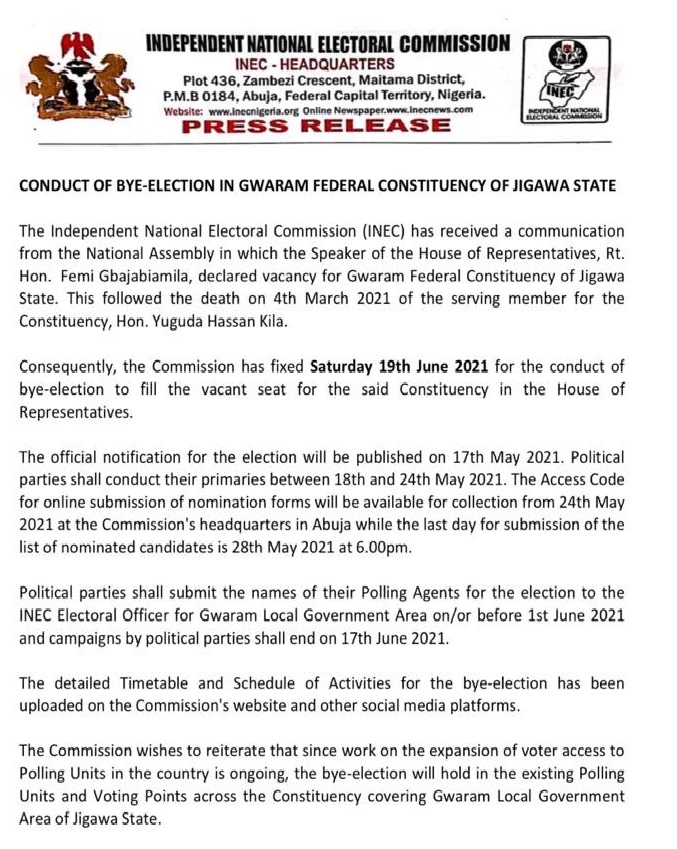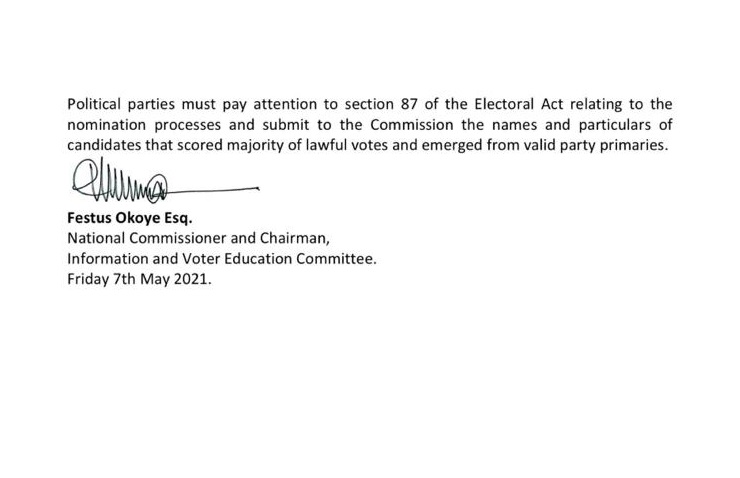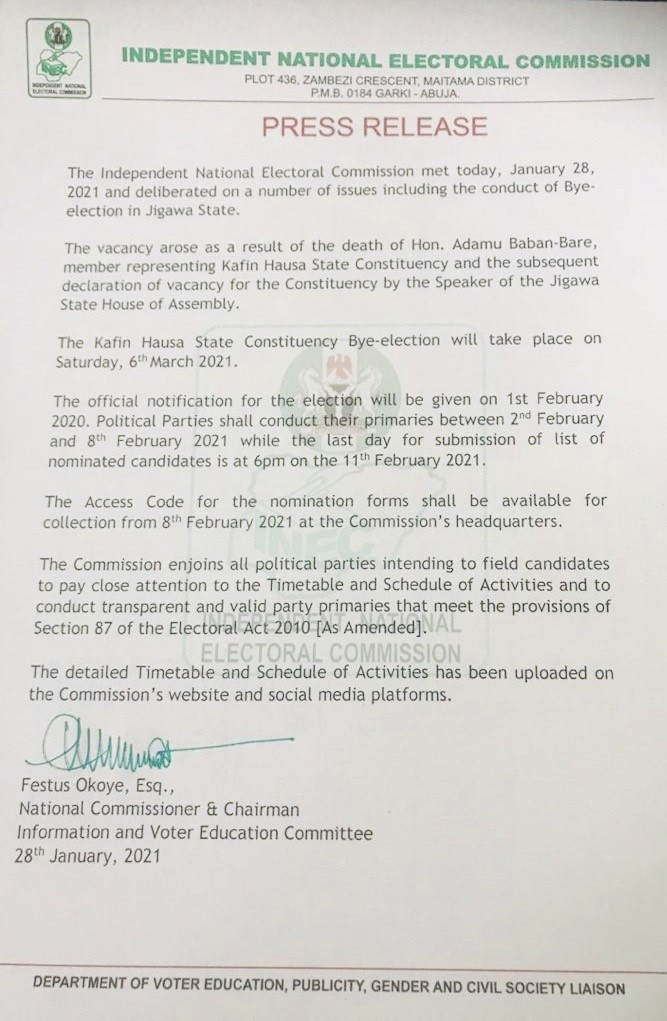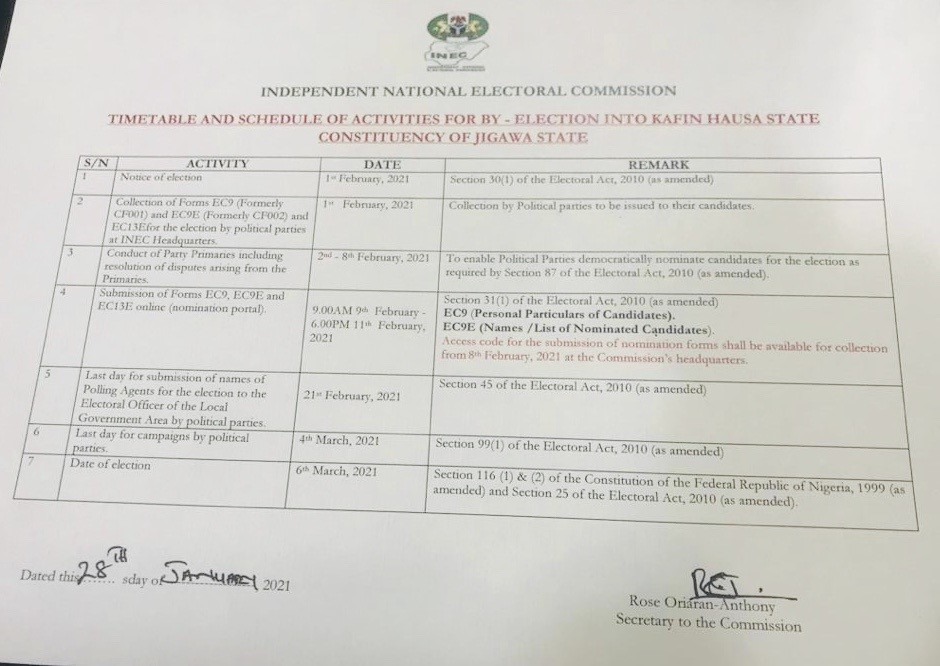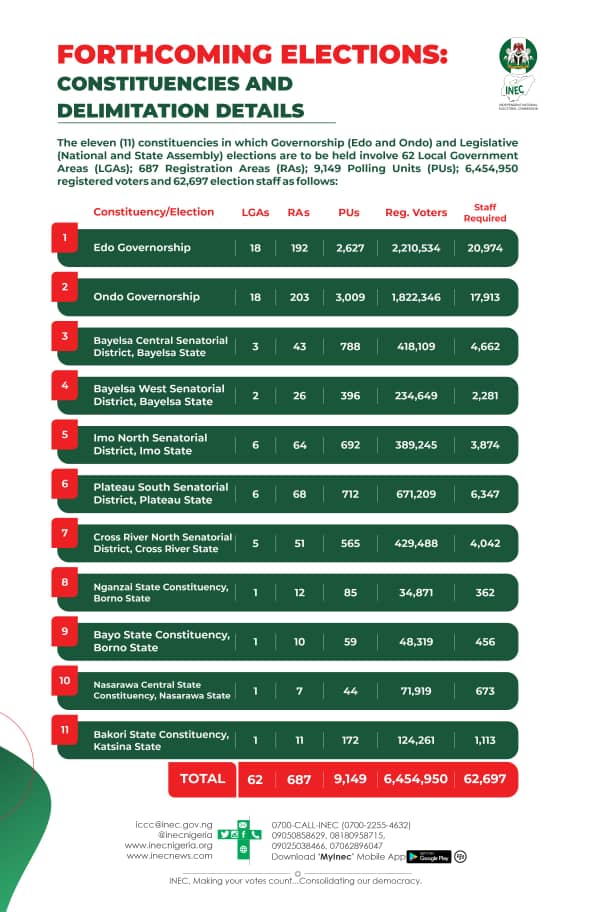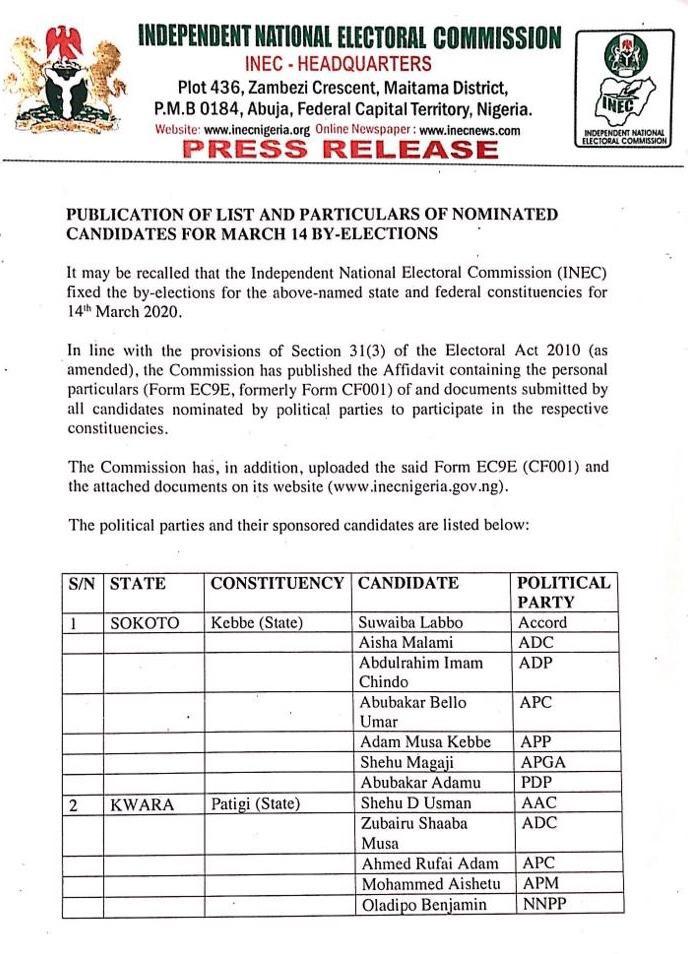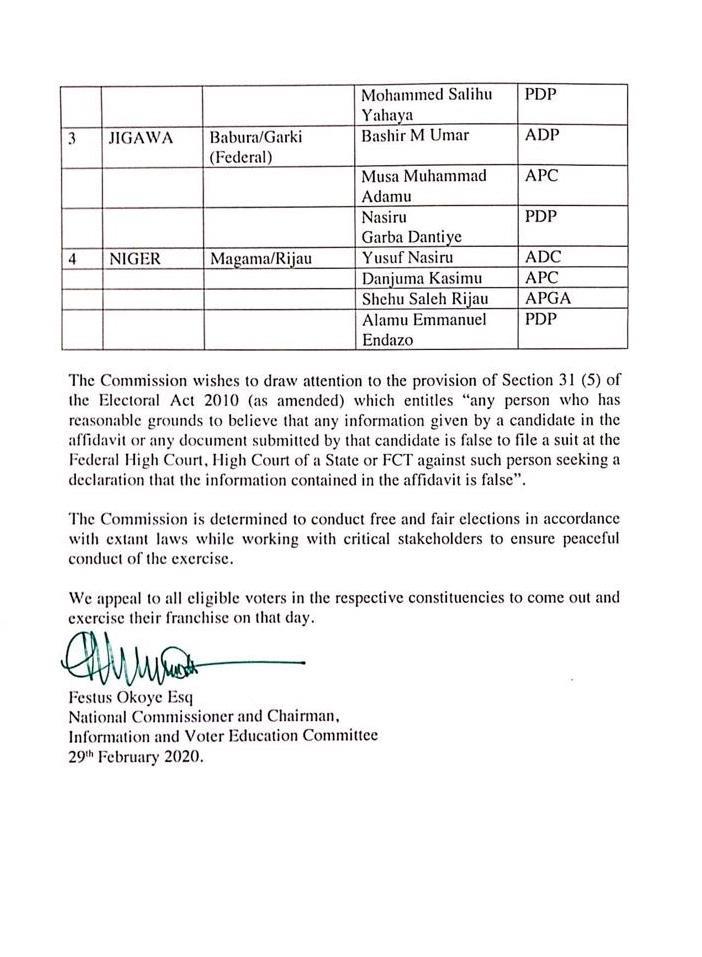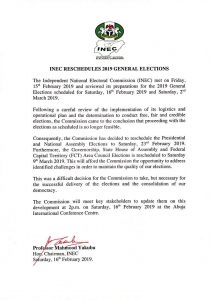Press Release
INDEPENDENT NATIONAL ELECTORAL COMMISSION
PRESS RELEASE
Our attention has been drawn to a fake news narrative circulated by a section of the social media claiming the purported death of the INEC Chairman, Prof. Mahmood Yakubu at a London hospital. The story first appeared on Monday, 9th December 2024.
We hereby appeal to the public to disregard the rumour. Prof. Yakubu is alive, hale and hearty. In fact, he has not travelled to London in the last two years. He was present at an interactive meeting with the House of Representatives Committee on Electoral Matters on Wednesday, 11th December 2024. He also chaired the Commission’s meeting with Resident Electoral Commissioners on Thursday, 12th December 2024. Both events were widely covered on television and reported on the front pages of most newspapers yesterday, Friday 13th December 2024.
The public may recall that mischief-makers on the social media carried a similar fake story in 2021. Three years later, they are spreading the same rumour again.
Those who indulge in this practice, as well as those who spread it, should be mindful of its effect not only on the individual but also the wider society.
The Commission will continue to work with genuine media professionals to combat the scourge of fake news and the danger it poses to society.
Mr. Rotimi Oyekanmi
Chief Press Secretary to the Chairman, INEC
Saturday 14th December 2024.

independent national electoral commission
press release
publication of the final list of candidates for bayelsa, imo and kogi states governorship elections
at its regular meeting held today tuesday 6th june 2023, the commission approved the final list of candidates for the three off-cycle governorship elections scheduled to hold in bayelsa, imo and kogi states on saturday 11th november 2023.
the decision is in line with the provision of section 32(1) of the electoral act 2022 which requires the publication of the list not later than 150 days to election day i.e. friday 9th june 2023 following the period for voluntary withdrawal and substitution of candidates by political parties under section 31 of the electoral act 2022.
the final list has been uploaded to the commission’s website and social media platforms. same will be published in our state and local government offices in the the affected states on thursday 8th june 2023 ahead of the statutory deadline of 9th june 2023.
the list shows that all 18 political parties are fielding candidates in kogi state, 17 in imo state and 16 in bayelsa state. the list also shows that two political parties are fielding female candidates in bayelsa state, one in kogi state and none in imo state.
the commission wishes to remind political parties and candidates that in line with timetable and schedule of activities for the three elections, campaign in public officially commences on wednesday 14th june 2023 in line with section 94(1) of the electoral act 2022 and ends on 9th november 2023 i.e. 24 hours prior to election day.
regrettably, the ugly incident last week involving the convoys of two political actors in kogi state resulting in the destruction of vehicles and other properties ahead of the commencement of campaign is worrisome. we urge parties and candidates to conduct their political activities with civility and decorum as peaceful electioneering heralds a peaceful election. political parties and candidates have a responsibility to de-escalate tension ahead of the elections.
barr. festus okoye
national commissioner and chairman, information and voter education committee
tuesday 6th june 2023
view full report click >> here
021
independent national electoral commission (inec) is pleased to announce the list of successful applicants accredited to observe the anambra state governorship election scheduled to hold on the 6th november, 2021.
all accredited groups are required to fill and complete the form ec 14 a (ii) online (https://observergroups.inecnigeria.org) between 23th august 2021 and 9th september, 2021. to enable all accredited observer groups complete form ec 14a (ii) online, observer groups are requested to visit election and party monitoring (epm)department, inec headquarters, maitama – abuja during official working hours or call 08033060569 to obtain access code (accreditation number) and number of field observers to be deployed.
in addition, hard copies and soft copies (flash drives) of the online submission containing the names and passport photographs of their members to be deployed on l.g.a basis should be submitted to epm department, inec headquarters abuja using jpeg drive.
all successful groups are also required to download at (https://wpsvr1.inecnigeria.org/synopsis-of-group-observation-form-2/).the synopsis of observation report (form ec 14b) is to be completed and submitted within 72 hours after the election to iccc@inec.gov.ng.
in accordance with the prevailing circumstance in the country, all accredited groups are required to fully comply with the inec covid – 19 policy on election and accreditation of observers including signing of the indemnity form and provision of personal protective equipment (ppe) for all field observers ( see inec website: www.inecnigeria.org) as failure to comply will lead to immediate withdrawal of accreditation.
the distribution of domestic observer kits (including id cards to individual observers) will be done in anambra state inec office between 1st and 5th november,2021. however, accredited foreign groups are required to collect their kits at the election and party monitoring (epm) department, independent national electoral commission (inec) headquarters, abuja between 25th october and 1st november, 2021.
all accredited observers shall abide by the code of conduct for election observers, which is available for download from the inec website (www.inecnigeria.org). inec reserves the right to cancel and withdraw the accreditation of any organisation at any point its members or agents breach the code of conduct.
sign.
inec
list of accredited obsever groups for anambra state governors election 2021
domestic observer groups (a)
s/n name of organisation
1. advocacy for quality leadership and health awareness foundation
2. advocates for peoples right & justice
3. africa for millenium change initiative
4. catholic caritas foundation of nigeria(ccfn) (justice development and peace commission)
5. centre for civic education (tmg)
6. centre for democracy and development
7. centre for citizens with disabilities (ccd)
8. centre for credible leadership & citizens awareness
9. centre for grassroot development and crime prevention
10. centre for positive change and civic responsibility
11. centre for strategic conflict management
12. centre for strategy,ethics and value
13. centre for transparency advocacy (cta)
14. citizens rights and leadership awareness initiative
15. cleen foundation
16. committee for the defence of human rights
17. committee of youth on mobilization and sensitization
18. education, social and health mission (mesh)
19. foundation for sustainable development and inclusive growth
20. future leaders global initiative
21. global development centre for rescue mission in nigeria
22. global hope and justice for the less privileged
23. global initaitive for africa development
24. global policy advocacy & leadership initiative
25. grassroot development and peace initiative
26. grassroot development centre for peace and social justice
27. grassroots accountability advocacy foundation
28. grassroots empowerment initiative for positive change and development
29. human rights monitor
30. ilimi wal hikmah islamic foundation
31. inclusive friends association
32. initiative for promotion of civic obligation and sustainable peace
33. initiative for youth transformation & positive change
34. institute of peace and conflict resolution
35. intercontinental leadership initiative
36. international federation of women lawyers (fida) nigeria
37. international organisation for sustainable development
38. international peace and civic responsibility centre (ipcrc)
39. international peace commission
40. international standard centre for developemnt
41. kimpact youth developemnt initiative
42. national committee of patriots
43. national council for women societies nigeria
44. national orientation agency
45. national human rights commission
46. national institute for legislative & democratic studies
47. new view global initiative for youth and women development
48. nigeria civil society situation room (policy and legal advocacy centre)
49. nigeria bar association
50. noble coordinators forum for the advancement of ethics and values
51. northern patriotic front
52. organisation of justice for equity sustenace
53. orient foundation for social justice and civic education
54. patriotic women foundation
55. police service commission
56. polling unit ambassadors of nigeria(puan vocational care initiative)
57. progressive youth’s initiative
58. society for equity,justice and peace (sejup) anglican commununion
59. sustainable initiative for nurturing growth (sing)
60. the albino foundation
61. the presidency auda-nepad nigeria
62. the adaobi enemuoh initiative for development
63. waterlight save initiative
64. women advocates research and documentation centre
65. women arise for change initiative
66. women’s right and peace protection initiative for africa
67. womenfest for betterlife living iniative
68. womens international league for peace and freedom nigeria
69. yiaga africa
70. youth and students advocates for development iniative (ysad)
71. youth initiative for better and great nigeria
72. zaram life foundation
foreign observer groups (b)
s/n name of organisation
1. british high commission
2. european union
3. international foundation for electoral systems
4. national democratic institute
5.
us consulate general
( mission nigeria)
delivery to @yahoo.com email accounts are heavily delayed. you can use your mobile number as your password to log in to continue your application.
this is a one-time password to your account if it is not yet active/verified. you will have to set a new password afterwards to continue
it will be recalled that on 6th february 2020, the independent national electoral commission (inec) fixed saturday 14th march 2020 for the conduct of bye-elections in three constituencies following the deaths of some serving members of the national and state assemblies. the honorable speaker of the house of representatives had declared a vacancy in magama/rijau federal constituency of niger state; the honourable speaker of the kwara state house of assembly had declared a vacancy in patigi state constituency while the speaker of the sokoto state house of assembly had also declared a vacancy in the kebbe state constituency.
subsequently, the national assembly, through a letter dated 10th february 2020, informed the commission of the death of honourable adamu muhammadu fagen gawo, member representing babura/garki federal constituency of jigawa state, who died on 31st december 2019. consequently, the honourable speaker of the house of representatives has declared the seat for babura/garki federal constituency vacant.
the commission has therefore fixed saturday 14th march 2020 for the bye-election to be held simultaneously with the other bye elections on the same date. the timetable and schedule of activities for the babura/garki federal constituency has been uploaded on the commission’s website and other social media platforms.
festus okoye esq.
national commissioner and chairman,
information and voter education committee.
12th february 2020.
INEC urges UNDP to support SDE phase 1 project
The Independent National Electoral Commission (INEC), has organized a training for its publicity officers.
the 4-day training, holding in Abuja, was made possible with the support of the European Union Centre for Electoral Systems (ECES).
chairman of the Information and Voter Education Committee (IVEC) of the commission, festus okoye esq. who declared the workshop open, yesterday, recalled that part of the challenges faced by the commission during the 2019 general election revolved around information management: “it revolves around strategic communication. it revolved around managing public perception around the processes and procedures of the commission”.
he continued: “it revolved around the caliber and knowledge of the staff saddled with managing its image and communicating to and with the public. it revolved around making information available to the media in real time to avoid speculation, rumor mongering and fake news”.
he therefore underscored the importance of the training thus: “this training will equip and empower you with modern skills of monitoring the activities of the media, to keep the commission abreast of issues as they break or begin to trend especially on the social media” .
“we believe that this is the way to go in being proactive in information driven society where political considerations and partisan posturing sometimes play a huge role in the dissemination of fake news, misinformation and disinformation.
”media monitoring will help us appreciate what is being said about us and where we need to respond and timely too”, he added.
the ivec chairman said, “the establishment of a media monitoring center within the commission is a step in the right direction. it is important for the commission as a public trust to understand what the mainstream and the social media are doing and saying. the media shapes, molds and defines the direction of public opinion in given circumstances” .
he continued: “as a commission that does not own radio and television stations, the commission relies on the media to get its messages across to the nigerian people. it is important for us to know whether our messages as a commission gets to the nigerian people and in what form the message gets to them. it is important for us to understand the mood of the nation and the interpretation given to the actions and inactions of the commission.
”it is important for the commission to use the instrumentality of the media to formulate policies, reshape policies and mold public opinion in given circumstances” said he.
barrister okoye highlighted the premium placed on information management by the commission and stressed the need for information managers of the commission to be knowledgeable. he said “the commission has consistently tried its best to provide information to the media. it has been upfront in media appearances and in some instances providing education on novel and unclear areas of the electoral process. this demands that the spokespersons of the commission must be conversant with the happenings in the commission.
“they must be conversant with its laws and procedures. they must be conversant with its processes and procedures. they must listen to the radio and the television. they must read newspapers of different qualities and varieties. they must access the social media platforms and understand the thinking of the different segments of the populace and their views about the electoral process”, he said.
he added: “they must decipher manipulated information from outright fake news. they must understand when information is skewed and slanted to appeal to a constituency or achieve a particular result or outcome. they must know when a report or opinion is based on outright ignorance. these must then be turned into actionable recommendations for better image management and policy formulation”.
the ivec chairman appreciated eces for facilitating the establishment of a world class media monitoring centre at the inec headquarters and called for sustained partnership between both organizations. his words: “the commission appreciates the collaborative partnership existing between it and the european centre for electoral support (eces) targeted at strengthening the processes of the commission, promoting nigeria’s electoral process and deepening our democracy”.
“the establishment of a world class media monitoring centre at the inec headquarters is no doubt a testimony to this collaborative effort. we assure our partners that the commission and its staff will make good use of the facilities at the media monitoring center to promote the work of the commission and in the process enhance its image”.
the director, voter education and publicity department, oluwole osaze-uzzi, explained that the training was long due. he said the media monitoring training was supposed to be a pre-election activity but noted that the training marked the commencement of full fledged media monitoring by the commission ahead of future elections.
he said: “this training has been a long time coming but, we are happy that it has eventually came. it has been on plan for many months. it was actually designed to be pre-election activity to build the capacity of staff of the commission to better monitor and look for trends in the media as they covered the 2019 general elections.
the director however noted that “it is never too late because election is a cycle. the end of one is the beginning of another, so, the end of 2019 is the beginning of another. until we end the elections in kogi, bayelsa, edo, ondo, we have not finished the circle. this is a continuous cycle. so it is never too late to hold such training and capacity building.
“basically, our work of monitoring has started. our work of monitoring does not start on election day, we must monitor everything, how aspirants emerged, how candidates emerged for party is critical. how a winner -members elect, governors elect emerges, all these factors we shall be taking into consideration”, he said.
chief press secretary (cps) to the inec chairman, rotimi oyekanmi, in his presentation on “fake news and the 2019 general elections, preparations for kogi and bayelsa governorship elections,” recounted several incidences of fake news the commission had to deal with before and during the 2019 general elections.
oyekanmi, lauded the commission’s proactiveness and openness to the media on its policies and actions.
he further called for a more strategic approach to image management and harped on the inevitable use of social media to inform the public, gauge perception and interact with the public.
the coordination advisor/electoral administration expert, with eces, wilson manji said the training represented another element of their support to inec’s “extremely active media, communications and outreach strategy”.
manji recalled previous professional trainings for staff of the department supported by eces and explained that “ this week’s training has the objective of introducing you to the basic skills and techniques used in media monitoring, that will contribute to improving the commission’s internal and external engagements with stakeholders, providing accurate information for a timely response to emerging issues in the entire polity through qualitative and quantitative data collection, processing, analysis and reporting throughout the commission” .
speaking on the objectives of the workshop, the deputy director publicity, aliyu m bello said the workshop was ”designed to train participants on use of modern technology to monitor radio, television and social media contents for informed contributions to improve perception”.
editor-in-chief: oluwole osaze-uzzi
editor: aliyu m. bello
reporter: nathaniel audu gana
technical support: bala ato agyo
Interested in a more scientific approach to the assessment of issues and challenges faced in the conduct of the 2019 general elections, the independent national electoral commission (inec) has commissioned a study group on survey of critical issues and challenges on the conduct of the elections.
the survey entitled: ‘’tei survey on critical issues and challenges that have impacted on the conduct, outcome and performance of inec in 2019 general elections’, will be conducted under the auspices of the electoral institute (tei) with professor s. s. muhammad of usmanu danfodiyo university sokoto as lead resource person.
the survey which will take about a month beginning from field work, to data analysis and final presentation of report of findings to the commission was ‘’designed to interrogate issues that are pertinent to successful strategic planning, implementation and execution of inec’s activities in the conduct of the 2019 general elections’’.
the director general of the tei, dr sa’ad idris umar hinted that the objectives of the survey was ‘’to generate empirical facts from the perspectives of nigerian citizenry on issues that have impacted on the conduct of the 2019 general elections’’.
on the methodology workshop which held yesterday at tei virtual library, dr sa’ad said ‘’the workshop was aimed at training field agents that will be engaged in the process of collection of vital information and data on the subject matter’’.
earlier in a remark the chairman, board of electoral institute, prince adedeji solomon shoyebi represented by national commissioner and member of the board of tei, dr mohammed mustafa lecky advised the field agents and the resource person ‘’to ensure proper sample selection as this is imperative to good and objective outcome’’.
the lead resource person also urged members of his team ‘to ‘’commit themselves in carrying out a credible fieldwork that will ensure an acceptable and empirically variable result’’.
editor-in-chief: oluwole osaze-uzzi
editor: aliyu m. bello
The Independent National Electoral Commission (INEC) has fixed august 30, 2019 as the last date for the submission of applications by observer groups wishing to participate in the november 16, 2019 in bayelsa and kogi states governorship elections.
earlier in a public document signed by the commission and also advertised on the commission’s website, inec has invited registered civil society organizations, non-governmental organizations and other interested stakeholders whose activities ‘’are focused on democracy, governance and elections and who wish to observe the bayelsa and kogi states governorship elections’’ to visit inec website (www.inecnigeria.org) for application forms.
‘’interested observer groups are required to download and complete the application form(s) ec14a (i) indicating the preferred state for observation and submit it along with other necessary documents to election and party monitoring department, inec headquarters, maiatama, abuja (including evidence of past election observation.
‘’list of successful observer groups for the two elections will be subsequently published in the national dailies and on the commission’s website’’, the document added.
organizations wishing to apply were however advised to be truthful in their submissions as ‘’any falsification of documents in the submission will lead to automatic disqualification and possible prosecution’’.
editor-in-chief: oluwole osaze-uzzi
editor: aliyu m. bello
The Independent National Electoral Commission (INEC) has said that four Political Parties have fielded candidates for the Pengana (Bassa1) State Constituency of Plateau state by election scheduled for Saturday 3rd August 2019.
This was contained in a document signed by the Secretary, to the Commission, Rose Oriaran-Anthony.
According to the document, the All Progressives Congress (APC), the Green Party of Nigeria (GPN), the National Conscience Party (NCP), and the Peoples Democratic Party (PDP) have sponsored Yakubu Yackson Sanda, Sunday Ayuba Matawal, Ado Chindo and Yakubu Busa Buji Jamaika to contest in the election, respectively.
It would be recalled that INEC scheduled the election following the transmission of a letter by Speaker Plateau State House of Assembly informing the Commission of the vacancy on account of the demise of the member-elect, Ezekiel Afon who passed on shortly after he was returned elected in March 2019 State and Governorship elections.
Pengana (Bassa1) State Constituency is a one (1) Local Government constituency with seven (7) Registration Areas, 60 Polling Units and 67, 033 registered voters.
The Commission said it would deploy a total of 617 staff for the conduct of the elections.
A break down of the number of the staff to be deployed indicates that INEC would deploy; 1 Returning Officer; 7 Registration Area Collation Officers; 7 Supervisory Presiding Officers; and 60 Presiding Officers.
Others are: 405 Assistant Presiding Officers (I,II,and III); 125 Assistant Presiding Officers (VP); 1 Constituency Supervisor; 1 LGA Supervisor; 8 Registration Area Cluster Supervisors; and 27 Reserve APOs .
In order to ensure efficient delivery of electoral services, the Commission has on Monday 22, July 2019 commenced the training of personnel who would preside over the polls.
The training is being coordinated by The Electoral Institute.
Editor-in-Chief: Oluwole Osaze-Uzzi
Editor: Aliyu M. Bello
The Independent National Electoral Commission (INEC) has described the cost of operation and logistics as enormous; says ‘’it’s an exercise the Commission continues to review from one election to another’’.
National Commissioner and Chairman of the Board of The Electoral Institute, Prince Adedeji Solomon Shoyebi made the statement at the opening of a one day ‘’Round Table on Revisiting the Template for INEC’s Election Operations and Logistics Plan’’, organized by the Commission through its Training, Research and Documentation outfit, the Electoral Institute (TEI) in Abuja, today.
The Round Table which theme, ‘’Focus on the 2019 General Election’’, re-examined the operational and logistical Plan of the Commission for the 2019 elections with a view to identifying challenges and proffering ideas for improved logistical architecture starting from Kogi and Bayelsa elections.
Commissioner Shoyebi said ‘’the cost of election operation and logistics is enormous and it’s an exercise the Commission continues to review from one election to another’’, adding that the Commission would continue to partner with National Union of Road Transport Workers (NURTW), Road Transport Employers’ Association of Nigeria (RTEAN), National Association of Road Transport Owners (NARTO), Nigeria Air Force (NAF) and the Nigeria Navy (NN) in the delivery of men and election materials to areas with difficult terrain.
‘’As an Election Management Body (EMB), the Commission will continue to engage the services of the NURTW, RTEAN, NARTO, Air Force and the Navy especially in delivering of personnel and materials to difficult terrains to ensure the conduct of free, fair, credible and acceptable elections’’, Commissioner Shoyebi said.
He explained that the Commission was not unaware of the challenges experienced during the 2019 elections but, ‘’the Commission rose up to the occasion and respond to the challenges, and that was why we had successful outings in the 2019 General Elections’’, he added.
In her contributions, National Commissioner Amina Bala Zakari urged all stakeholders to own up the process by dispensing positive and productive attitudes that can promote an enduring electoral environment. She noted that, the trust deficit in the system was a critical issue to deal with – as that has overtime compelled the Commission to spend highly in the acquisition and securing of high-quality election materials to prevent manipulations and counterfeits, which she said was not the case in many Countries.
Earlier in his welcome address, the Director-General of the TEI, Dr Sa’ad Umar Idris hinted that the Round Table was designed to examine ‘’…factors that affected the smooth implementation of the operations and logistic plan (of the Commission) in the conduct of the 2019 General Elections’’.
The Round Table was attended by senior members of the Academic Community, Civil Society Organizations, Development and Elections Experts, as well as Consultants who made inputs into the on-going discussion.
Editor-in-Chief: Oluwole Osaze-Uzzi
Editor: Aliyu M. Bello
Gentlemen of the press,
Following the issuance of the Time Table and Schedule of Activities for the 2019 General Elections in January last year, the Commission successfully undertook all planned activities, culminating in the conduct of all but a few of the 1,558 offices and legislative seats.Certificates of Return have been given to the President-elect, Vice-President Elect and members-elect of the National Assembly.
PRESENTATION OF CERTIFICATES OF RETURN TO GOVERNORS-ELECT
Certificates of Return in respect of Governors-elect shall be presented by supervising National Commissioners of the respective states between Wednesday 27th and Friday 29th March 2019. They will be assisted by Resident Electoral Commissioners and Legal Officers of the Commission.
The precise date for the presentation in each state shall be made known by the respective Resident Electoral Commissioners after consultation with the supervising National Commissioners
For the State Houses of Assembly, the date of presentation of Certificates of Return to the respective winners will be announced in due course.
SUPPLEMENTARY ELECTIONS
- Supplementary elections will be conducted in 18 states of the federation on 23rd March 2019. Details of the states and constituencies where the elections will take place will be uploaded on our website before the close of work today.
- All observers and the media accredited by the Commission to cover the 2019 general elections are free to observe the elections. They will have unimpeded access to the material distribution centres, polling units and collation centres.
- Arising from the meeting held on 19th March 2019 between INEC and security agencies, the latter have given the assurances of adequate security, professional conduct and unimpeded access to all levels of the election and collation centres.
- The INEC Situation Room will be activated on Saturday 23rd March 2019. Nigerians can reach the Commission via 0700-2255-4632 and its social media platforms (twitter: @inecnigeria; Facebook: INEC Nigeria).
- The Commission encourages all registered voters in the areas where elections will be conducted to come out and cast their ballots. We also appeal to all stakeholders for continuous support.
PENDING CASES IN BAUCHI AND ADAMAWA
The Commission has conducted governorship elections in 29 states and returns have been made in 22 states. While the election was suspended in Rivers, it was declared inconclusive in 6 states namely Bauchi, Adamawa (North East); Benue and Plateau (North Central) and Sokoto and Kano (North West).
Following the inconclusive governorship elections in the 6 states, the Commission fixed supplementary elections for the 23rd of March 2019.
The supplementary governorship election earlier scheduled to hold in Bauchi state is now a subject of litigation, which was initiated by the All Progressives Congress (APC) and its candidate, Mohammed A. Abubakar. An interlocutory injunction to suspend the process has been served on the Commission by the Federal High Court, Abuja. While the Commission has complied in accordance with its policy to obey all court orders in deference to the rule of law, it has also taken urgent steps to vacate the order and dismiss the action.
It should however be noted that the litigation and consequential order only affect the collation of results for the governorship election in Tafawa Balewa Local Government Area. Consequently, the supplementary elections will proceed as scheduled on Saturday 23 March in the other 15 Local Government Areas of Bauchi state as well as the Kirfi State Constituency Supplementary Election in Kirfi Local Government Area.
Similarly, the Adamawa State High court issued an injunction restraining the Commission from proceeding with the supplementary election following the application by the Movement for the Restoration and Defence of Democracy (MRDD), a registered political party which did not take part in the main election. While the Commission has also complied with the order, it has equally taken steps to vacate it and dismiss the action.
Notwithstanding the legal action over the Supplementary Governorship election, elections will hold in Nassarawo/Binyeri State Constituency in Mayo – Belwa Local government area where the election had to be countermanded following the death of a candidate before the polls, as well as the supplementary State Constituency election and Uba/Gaya State Constituency in Hong Local Government Area.
RESUMPTION OF ELECTORAL PROCESS IN RIVERS STATE
Following the violent disruption of the electoral process in Rivers during the Governorship and State Assembly elections on 9th and 10th March 2019, the Commission was compelled to suspend the process.
The Commission set up a Fact-Finding Committee that visited Rivers State and submitted its report which revealed that while election could not hold in a few areas, it was successfully concluded in others with the declaration of winners in 21 state constituencies. Collation was on-going at the time of the suspension of the process. The activities and timelines for the resumption and conclusion of the process are as follows:
Detailed Timelines & Activities for Completion of the General Elections in Rivers
| S/N | Activity | Timeline | Location/Venue |
| 1 | Engagement with security agencies | 19thMarch | Abuja |
| 2 | ICCES meeting (Rivers State) | 29th March | Port Harcourt |
| 3 | Meeting with Stakeholders | 30th March | Port Harcourt |
| 4 | Issuance of Guidelines for resumption of collation of results | 1st April | INEC Headquarters, Abuja |
| 5 | Revalidation of Polling Agents and Observers for collation of results | 25th– 31st March | Abuja and Port Harcourt |
| 6 | Resumption of collation and announcement of results | 2nd – 5thApril | Port Harcourt (Venue to be agreed with stakeholders) |
| 7 | Supplementary elections where necessary | 13th April | Various locations |
| 8 | Announcement of results of all supplementary elections | 13th – 15th April | Various locations |
| 9 | Issuance of all outstanding Certificates of Return | Latest 19th of April | INEC Office, Port Harcourt |
Festus Okoye Esq.
National Commissioner and Chairman,
Information and Voter Education Committee
21st March 2019.

INDEPENDENT NATIONAL ELECTORAL COMMISSION
PRESENTATION OF CERTIFICATES OF RETURN
The Independent National Electoral Commission (INEC) will on Thursday 14th March 2019 present Certificates of Return to all successful candidates in the 2019 National Assembly Elections held on 23rd February 2019. The presentation will take place as follows:
1. Venue: Main Hall (Africa Hall), International Conference Centre, Abuja
2. Time: 10 am (Senators-elect); 2 pm (Members of the House of Representatives-elect)
All Senators-elect, members of the House of Representatives-elect and their guests are expected to be seated by 9.30am and 1.30pm respectively. All National Assembly members-elect are required to come along with photo identification, such as Permanent Voter’s Card, Nigerian Driver’s License, National Identity Card or International Passport.
Each member-elect is entitled to be accompanied by a maximum of five (5) guests only. The National Chairman and National Secretary of political parties that sponsored members-elect are also invited.
NOTE: Only members – elect as listed on the Commission’s website (www.inecnigeria.org) are invited to the ceremony.
Journalists, Foreign and Domestic Observers accredited to the National Collation Centre are also invited but must come along with their accreditation tags.
Official video and still photographers shall be available. No personal photographers will be allowed into the hall.
Parking has been reserved for members-elect and their guests at the Peace Park beside the Abuja International Conference Centre (Zone B) and the Old Parade Ground (Zone C)
Signed
Rose Orianran-Anthony
Secretary to the Commission
Since the conduct of the February 23, 2019 Presidential and National Assembly elections, there has been allegations from certain quarters that the Independent National Electoral Commission (INEC) was selective in its use of Smart Card Readers (SCRs) in its conduct of the elections. These allegations have led to speculations that INEC may be forced to jettison their use in the March 9, 2019 Governorship, State Houses of Assembly and Federal Capital Area Council elections.INEC hereby states categorically that the allegations are absolutely false and the speculations are without any basis whatsoever. The use of the Smart Card Reader is not only mandatory but its deliberate non-use attracts the sanction of possible prosecution of erring officials in accordance with the INEC Regulations and Guidelines for the conduct of elections. This is in addition to the voiding of any result emanating from such units or areas as was done in the Presidential and National Assembly elections of February 23, 2019.
The general public and all officials engaged for the elections are hereby informed that the Commission is not reconsidering the use of these Smart Card Readers which has greatly improved the credibility of our elections and instilled a high level of public trust in them.
To clear any doubt or ambiguity, we wish to state that the deployment and mandatory use Smart Card Readers in Saturday’s elections will not only be uniform but also universal, and the provisions of the Regulations and Guidelines will be strictly and vigorously enforced. All Stakeholders are to note and be guided accordingly, please.
Festus Okoye Esq, National Commissioner & Chairman, Information & Voter Education Committee.
Click here to download full documents>> USE OF SMART CARD READERS
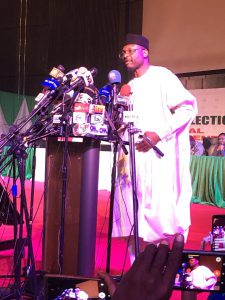
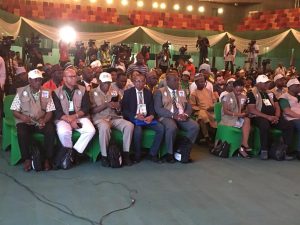
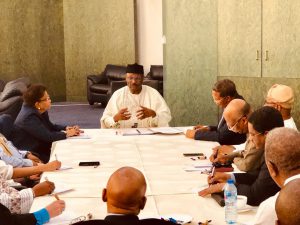
- About thirteen hours ago, I conveyed to Nigerians the decision of the Independent National Electoral Commission (INEC) to reschedule the 2019 general elections by one week. Presidential and National Assembly earlier scheduled for 16th February 2019 will now hold on Saturday 23rd February 2019 while Governorship, State Assembly and FCT Area Council elections scheduled for 2nd March 2019 will now hold on Saturday 9th March 2019. The one-week adjustment was a painful one for INEC but necessary in the overall interest of our democracy.
- Nigerians will recall that when this Commission was appointed in November 2015, we promised two cardinal things. First, we shall work hard to consolidate the improvements made in the management of elections in Nigeria since 2011. Secondly, we shall always be open, transparent and responsive. We have strived diligently to keep these promises in very trying circumstances.
- In keeping with our promise to consolidate the gains of the last two electoral cycles, the Commission has conducted 195 re-run and off-season elections across the country since the last general elections. Most of these elections have been generally adjudged to show progressive improvements in planning, execution and outcomes.
- This commitment to continue to improve on election administration has informed our preparations for the 2019 general elections. Our goal is to plan carefully, execute meticulously and bring stability into election management in Nigeria. Consequently, we announced fixed dates for elections in Nigeria to the effect that Presidential and National Assembly elections will always hold on the third Saturday in February of an election year, while the Governorship and State Assembly elections follow two weeks later. Having settled this, we began the planning quite early, with a Strategic Plan (SP), a Strategic Programme of Action (SPA) and an Election Project Plan (EPP). In fact, the plan for the 2019 general elections was ready in November 2017 and we subsequently issued the timetable and schedule of activities for the elections over one year ago on 9th January 2018. We carefully followed the timetable and implemented 13 of the 14 activities as scheduled. We kept to the timeframe and have not missed the date fixed for any single activity.
- In preparing for the 2019 general elections, we have come face-to-face with the realities of conducting such an extensive national deployment of men and materials in a developing country like ours. It is said that elections constitute the most extensive mobilization of men and materials that any country could undertake in peacetime. The challenges of doing so, even under the best of circumstances, are enormous. Within a period of 16 months, we registered over 14 million Nigerians as new voters, collecting their names, addresses, photographs and their entire ten fingerprints. Beyond that, we prepared, printed and delivered their permanent voter’s cards for collection. I should note that of the 14.28 million Permanent Voters’ Cards (PVCs) made available for collection, about 10.87 million or 76.12% have been collected.
- It is often not appreciated the magnitude of activities that the Commission undertakes during general elections. Not only we have recruited and trained about 1 million young people to serve as ad hoc staff, the magnitude of materials mobilized for our elections is enormous. For instance, the Commission has printed 421.7 million ballot papers for six scheduled elections, as well as 13.6 million leaves of result forms for the Presidential election alone. Indeed, managing 91 political parties and 23,316 candidates for whom votes will be cast in 119,973 polling units by over 84 million voters is certainly astounding. No doubt, preparations for the 2019 general elections have been extremely tasking for the Commission.
- It is therefore not unexpected that such a tremendous national mobilization of men and materials will encounter operational challenges and we have had our own fair share of such challenges. There has been delays in delivering ballot papers and result sheets for the elections which is not unusual. However, I must emphasize that all the ballot papers and result sheets were ready before the elections despite the very tight legal timeframe for finalizing nomination of candidates and dealing with the spate of legal challenges that accompany it. In this regard, the Commission has been sued or joined in over 640 court cases arising from the nomination of candidates. As at today, there are 40 different court orders against the Commission on whether to add or drop candidates. The net effect of these is that there is usually roughly a one-month window for the Commission to print ballot papers and result sheets and either fly or transport them to several destinations until they finally get to each polling unit. Unfortunately, in the last one week, flights within the country have been adversely affected by bad weather. For instance, three days ago, we were unable to deliver materials to some locations due to bad weather. We therefore had to rely on slow-moving long haulage vehicles to locations that can be serviced by air in spite of the fact that we created five zonal airport hubs – Abuja (North Central), Port Harcourt (South South and South East), Kano (North West), Maiduguri and Yola (North East) and Lagos (South West) to facilitate the delivery of electoral logistics.
- Apart from these logistical challenges, we also faced what may well be attempts to sabotage our preparations. In a space of two weeks, we had to deal with serious fire incidents in three of our offices in Isiala Ngwa South Local Government Area of Abia State, Qu’an Pan Local Government Area of Plateau State and our Anambra State Office at Awka. In all three cases, serious disruptions were occasioned by the fire, further diverting our attention from regular preparations to recovery from the impact of the incidents. In Isiala Ngwa South, hundreds of PVCs were burnt, necessitating the re-compiling of the affected cards and reprinting in time to ensure that the affected voters are not disenfranchised. I am glad that all the cards were quickly reprinted and made available for collection by their owners.
- In Qu’an Pan Local Government Area, our entire office was razed, destroying all the materials prepared for the elections – printed register of voters, ballot boxes, voting cubicles and several electricity generating sets. 11 Registration Areas and over 100 polling units were affected by the fire. We recovered quickly and have since replaced everything destroyed. In addition, we secured a suitable building from which to conduct the elections.
- Perhaps the most serious was the fire incident in our Anambra State Office at Awka, which destroyed over 4,600 Smart Card Readers being prepared for the elections. These Card Readers take at least six months to procure. Despite this setback, we have practically recovered from this by mopping up every available spare SCR across the country and within 24 hours delivered them for elections to hold in Anambra State.
- All these challenges mean that there have been differences in preparations from one State to another. Our overall assessment is that if the elections went on as planned, polls will not open at 8am in all polling units nationwide. Yet, we are determined that polls must hold at the same time everywhere in the country. In this way, elections will not be staggered. This is very important to public perception of elections as free, fair and credible. We promised Nigerians that we shall be open, transparent and responsive.
- Faced with these challenges, we initially thought that we only require a maximum of 24 hours to resolve the logistics issues involved and complete our deployment for the election. This would mean shifting the elections to commence on Sunday 17th February 2019. However, given the restriction of movement during elections, that could affect many voters who worship on Sundays. While the Commission was considering the following Monday 18th February 2019 as an option, our ICT Department advised us that it would require 5 – 6 days to reconfigure about 180,000 Smart Card Readers earlier programmed to work only on election day – Saturday 16th February 2019. It is for this reason that the Commission decided to adjust the election dates to Saturday 23rd February 2019 for Presidential and National Assembly elections and a consequential adjustment of the Governorship, State Assembly and FCT Area Council elections to Saturday 9th March 2019.
- Some sensitive materials have been distributed. However, all such materials have been retrieved and will be taken back to the custody of the Central Bank of Nigeria. I want to assure you that there will be proper audit to account for all materials.
- In the next few days, the Commission will work on the basis of the following plan:
- Completion/confirmation of deployment of materials: Monday 18th February 2019
- Configuration of the Smart Card Readers – Sunday 17th – Thursday 21st February 2019
- Receipt and Deployment of sensitive materials to LGAs – Wednesday 20th and Thursday 21st February 2019
- Refresher training for ad hoc staff – Thursday 21st February 2019
- Deployment of personnel to RACs – Friday 22nd February 2019
- Election Day – Saturday 23rd February 2019
- I want to appeal to Nigerians and all other stakeholders for their understanding in what has been a very difficult decision for the Commission. But we believe that ultimately this is for the good of our democracy and country. I wish to assure you of our commitment to free, fair and credible elections.
- As Chairman of INEC, and on behalf of the Commission, we take full responsibility for what happened and we regret any inconvenience our decision might have caused.
- Thank you and God bless.
Honourable National Commissioners Resident Electoral Commissioners Senior Officials of the Commission Ladies and Gentlemen
i. The collection of PVCs scheduled to end today Friday 8th February 2019 is hereby extended nationwide to Monday 11th February 2019. This will include Saturday and Sunday.
ii. The collection of PVCs will now take place from 9am to 6pm daily.
iii. All State offices are hereby directed to review the procedure for the collection of PVCs and dedicate all the staff of the Local Government offices to the collection process. Staff are enjoined to be civil in attending to citizens and to escalate issues that they cannot immediately resolve to their superiors.
